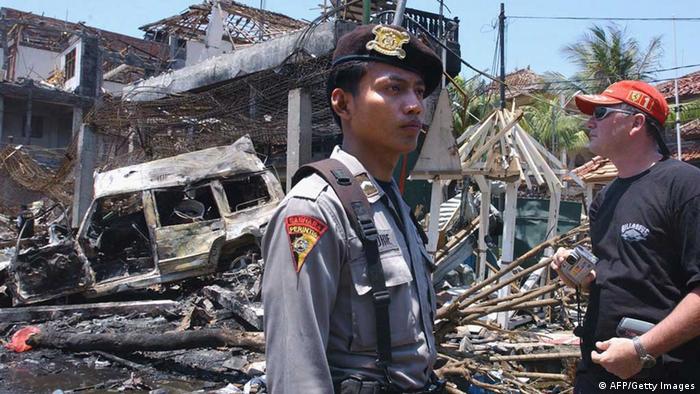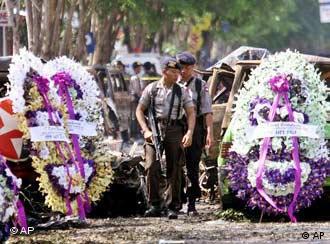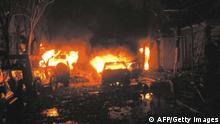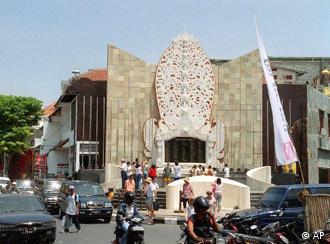
Ten years ago, the largest terror attack in Indonesia's history
killed 202 people. Though experts doubt the likelihood of such an attack
today, they warn of radical ideas spreading among the population.
It was late evening. The bars and night clubs in the old part of Kuta,
on Indonesia's popular resort island of Bali, were filled. Music poured
from them onto the streets; from places like Paddy's Pub and the Sari
Club, located opposite each other on Jalan Legian, a busy street in
Kuta.
The old town of Kuta has long been an attraction for tourists and backpackers touring Asia. Many of them come from neighboring Australia.
Then, at 11:05 p.m. local time, a bomb exploded in Paddy's Pub. Some people were killed, others injured. Panic broke out.
Worst attack in Indonesia's history
Many disco visitors fled into the street - and became victims of a second, even more powerful detonation. A parked minivan on the other side of the street flew into the air and destroys the Sari Club.
 Indonesian police walk past flower displays at the bombing site
Indonesian police walk past flower displays at the bombing site
The day, October 12, 2002, saw 202 mostly young tourists die in the worst attack in Indonesia's history.
Since then, Indonesia has invested heavily in fighting terrorism and organized several large manhunt operations. Much has changed in the fight against terrorism a decade after the Bali bombing. Most of the terrorists involved in the attack were arrested, executed or killed in police raids. But the danger of Islamic terrorism remains.
A study by the International Crisis Group (ICG) from July 2012 claims that Islamic activities have shifted in Indonesia. The best-known terrorist group in the country, Jemaah Islamiyah, took part in several terrorist acts in the past, including the attacks on the Marriott Hotel in Jakarta in 2003 and the Australian Embassy in Indonesia's capital in 2004.
Dakwah movement
"Today, radical groups such as Jemaah Islamiyah try to win sympathizers by occupying topics that match their Dakwah targets," the report says. Dakwah is the name of the Islamic revivalist movement that originated in Malaysia, turned radical in the 1970s and has since spilled over into Indonesia.
 Terrorists chose a popular tourist street for their attack
Terrorists chose a popular tourist street for their attack
The Jemaah Islamiyah network had to reorient itself after members
realized that without broad popular support they would never realize
their idea of creating an Islamic state in Indonesia. So now they are
now trying to reach larger masses with their Dakwah movement by
translating Jihadist materials from Arabic to English and disseminating
the information via the Internet.
"The transitions of the terrorist groups are seamless," Indonesian terrorist expert Al Chaidar told DW. "The groups form various wings, then break apart or may merge again. And that's what has happened with those who did not agree with the Jemaah Islamiyah's change of direction, broke with the organization and established smaller terrorist organizations."
The main danger lies in the fact that there are no large, shared goals. Today, the terrorists work in small cells with five to ten members. They operate independently without communication with each other and pursue different agendas.
Letter bombs
"In the foreseeable future, there probably won't be any major terrorist acts in Indonesia with hundred-pound bombs," said Indonesian terrorist expert Solahudin who, like many Indonesians, uses only one name. Instead, he told DW, radical Islamists conduct more minor acts of terrorism.
 A monument in Bali remembers the victims of the bombing
A monument in Bali remembers the victims of the bombing
In recent times, police have been increasingly targeted by
terrorists. And assassinations of security officials have increased over
the past two years. "It is more difficult today to identify racial
terrorist gropes because their organizational structures are smaller,"
Solahudin said.
But not only police and security officials are being increasingly targeted by terrorists, but moderate Islamists as well. In March 2011, the office of the liberal Islamic scholar Ulil Abshar Abdalla received a letter bomb. A similar package was also sent to the home address of a higher anti-terror official and on some other people identified as Islamic opponents by terror groups.
Indonesia has, indeed, made progress in dismantling large terrorist groups. But problems remain. "Since the financial support of Indonesian terrorist groups by al Qaeda has dried up, terrorists in Indonesia have become more independent," said Chaidar
Competing or complementary groups?
So Islamists in Indonesia are now split into two large organizations that preach the Dakwah objectives and in several smaller groups that carry out terrorists acts. The International Crisis Group warns, however, that these groups complement each other in dangerous ways. The larger organizations finance the Dakwah movement and could arouse the interest of certain people to join the terror campaign of the smaller groups.
But Al Chaidar has a different view. "The larger organizations like Jemaah Islamiyah try to protect their members from being recruited by the smaller groups to carry out acts of terrorism," he said.
The ideologies of radical Islam find quite fertile soil in Indonesia, according to the Pew Research Center. According to the research institute, 22 percent of the country's population showed sympathy for the al Qaeda network in 2011. That is an increase, compared with a 2005 study showing that only about 10 percent of the Muslims in Indonesia, nearly 16 million people, approved the terrorist acts of Jemaah Islamiyah.
The swing in public opinion shows how skillfully groups like Jemaah Islamiyah have been able to position their ideologies now in the middle of Indonesian society. Ten years after the terrorist attacks in Bali, Indonesia may be armed against major terrorist attacks but has yet to craft a promising strategy to fight the growing influence of radical ideas in the population.
The old town of Kuta has long been an attraction for tourists and backpackers touring Asia. Many of them come from neighboring Australia.
Then, at 11:05 p.m. local time, a bomb exploded in Paddy's Pub. Some people were killed, others injured. Panic broke out.
Worst attack in Indonesia's history
Many disco visitors fled into the street - and became victims of a second, even more powerful detonation. A parked minivan on the other side of the street flew into the air and destroys the Sari Club.
 Indonesian police walk past flower displays at the bombing site
Indonesian police walk past flower displays at the bombing siteSince then, Indonesia has invested heavily in fighting terrorism and organized several large manhunt operations. Much has changed in the fight against terrorism a decade after the Bali bombing. Most of the terrorists involved in the attack were arrested, executed or killed in police raids. But the danger of Islamic terrorism remains.
A study by the International Crisis Group (ICG) from July 2012 claims that Islamic activities have shifted in Indonesia. The best-known terrorist group in the country, Jemaah Islamiyah, took part in several terrorist acts in the past, including the attacks on the Marriott Hotel in Jakarta in 2003 and the Australian Embassy in Indonesia's capital in 2004.
Dakwah movement
"Today, radical groups such as Jemaah Islamiyah try to win sympathizers by occupying topics that match their Dakwah targets," the report says. Dakwah is the name of the Islamic revivalist movement that originated in Malaysia, turned radical in the 1970s and has since spilled over into Indonesia.
 Terrorists chose a popular tourist street for their attack
Terrorists chose a popular tourist street for their attack "The transitions of the terrorist groups are seamless," Indonesian terrorist expert Al Chaidar told DW. "The groups form various wings, then break apart or may merge again. And that's what has happened with those who did not agree with the Jemaah Islamiyah's change of direction, broke with the organization and established smaller terrorist organizations."
The main danger lies in the fact that there are no large, shared goals. Today, the terrorists work in small cells with five to ten members. They operate independently without communication with each other and pursue different agendas.
Letter bombs
"In the foreseeable future, there probably won't be any major terrorist acts in Indonesia with hundred-pound bombs," said Indonesian terrorist expert Solahudin who, like many Indonesians, uses only one name. Instead, he told DW, radical Islamists conduct more minor acts of terrorism.
 A monument in Bali remembers the victims of the bombing
A monument in Bali remembers the victims of the bombingBut not only police and security officials are being increasingly targeted by terrorists, but moderate Islamists as well. In March 2011, the office of the liberal Islamic scholar Ulil Abshar Abdalla received a letter bomb. A similar package was also sent to the home address of a higher anti-terror official and on some other people identified as Islamic opponents by terror groups.
Indonesia has, indeed, made progress in dismantling large terrorist groups. But problems remain. "Since the financial support of Indonesian terrorist groups by al Qaeda has dried up, terrorists in Indonesia have become more independent," said Chaidar
Competing or complementary groups?
So Islamists in Indonesia are now split into two large organizations that preach the Dakwah objectives and in several smaller groups that carry out terrorists acts. The International Crisis Group warns, however, that these groups complement each other in dangerous ways. The larger organizations finance the Dakwah movement and could arouse the interest of certain people to join the terror campaign of the smaller groups.
But Al Chaidar has a different view. "The larger organizations like Jemaah Islamiyah try to protect their members from being recruited by the smaller groups to carry out acts of terrorism," he said.
The ideologies of radical Islam find quite fertile soil in Indonesia, according to the Pew Research Center. According to the research institute, 22 percent of the country's population showed sympathy for the al Qaeda network in 2011. That is an increase, compared with a 2005 study showing that only about 10 percent of the Muslims in Indonesia, nearly 16 million people, approved the terrorist acts of Jemaah Islamiyah.
The swing in public opinion shows how skillfully groups like Jemaah Islamiyah have been able to position their ideologies now in the middle of Indonesian society. Ten years after the terrorist attacks in Bali, Indonesia may be armed against major terrorist attacks but has yet to craft a promising strategy to fight the growing influence of radical ideas in the population.
沒有留言:
張貼留言